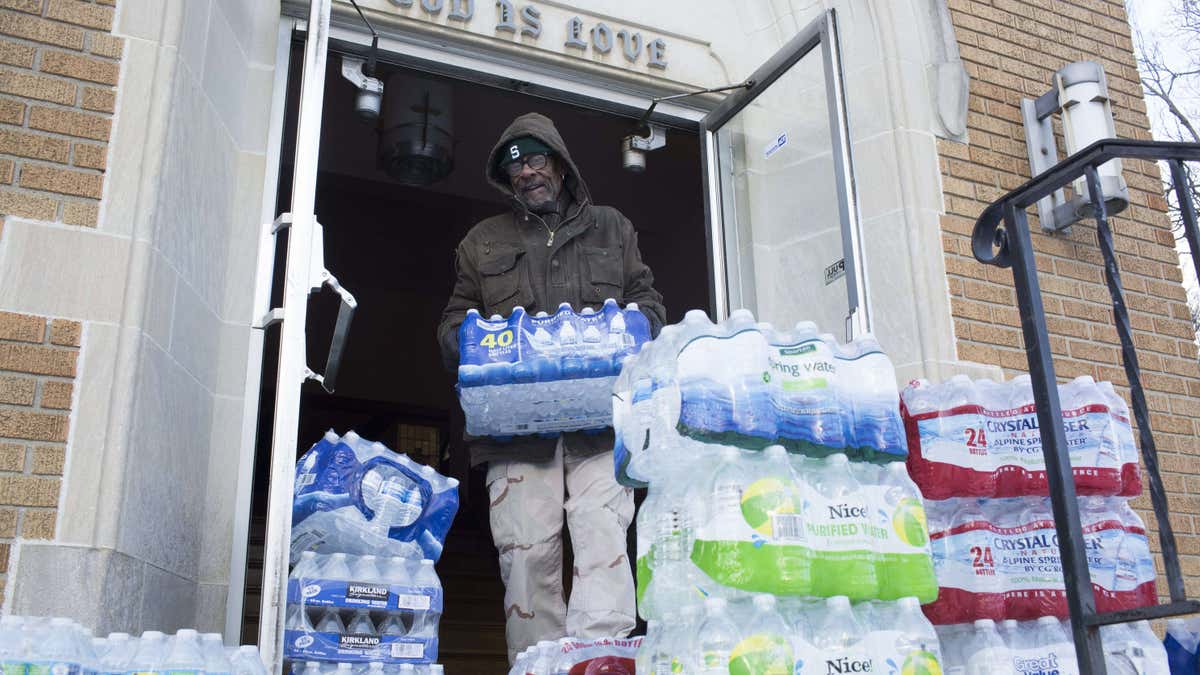
Jan. 11, 2016: Maurice Rice organizes cases of water at the Joy Tabernacle Church in Flint, Mich. (Conor Ralph/The Flint Journal-MLive.com via AP)
Members of the Michigan National Guard began arriving in Flint on Wednesday for briefings on the drinking water crisis just as state health officials reported a spike in Legionnaires' disease cases in the county where the city is located.
Gov. Rick Snyder had activated the National Guard late Tuesday, and Lt. Col. William Humes confirmed about a half-dozen representatives arrived Wednesday morning. They are part of a larger contingent of Guardsmen who will help distribute bottled water, filters and other supplies to residents.
Flint's tap water became contaminated with too much lead after the city switched its water supply in 2014 to save money while under state financial management. Local officials first declared a public health emergency in October in response to tests that showed children with elevated levels of lead.
"I'm glad the state is putting in resources and we welcome the Michigan National Guard with open arms," Flint Mayor Karen Weaver said in a statement. "However, we also need federal assistance as we continue to cope with this man-made water disaster."
Meanwhile, Michigan's Department of Health and Human Services said Wednesday that there's been an increase in Legionnaires' disease cases during periods over the past two years in Genesee County.
Legionnaires' disease is a type of pneumonia caused by bacteria that infect the lungs. Health officials say they can't conclude that the increase is related to Flint's water crisis.
There were 45 confirmed cases, including seven associated deaths, in Genesee County from June 2014 to March 2015. In 47 percent of the cases, the water source at the primary residence was from the Flint River. A comparative chart that officials provided shows only 21 cases were confirmed in all of 2012 and 2013.
Preliminary data also indicates 42 cases of Legionnaires' disease between May 2015 and November 2015, with three deaths, health officials said.
A Legionnaires' disease outbreak in western Illinois last summer that killed 12 and sickened dozens was likely spread by an aging water system at a 129-year-old facility that lacked several safeguards, The Associated Press reported last month based on a federal report.
In Michigan, Snyder has requested support from the Federal Emergency Management Agency in coordinating a recovery plan with other federal agencies that have the programs, authorities or technical expertise to help with Flint's water crisis.
FEMA appointed a disaster recovery coordinator to assist, spokesman Rafael Lemaitre said.
About 30 Guardsmen will be in place by Friday, enabling American Red Cross volunteers to join the door-to-door efforts that began Tuesday instead of staffing sites where residents can pick up free bottled water, filters, replacement cartridges and home water testing kits.
Genesee County sheriff's Capt. Casey Tafoya has said volunteers and police hoped to get to 500 to 600 houses a day in a city of about 99,000 residents with an estimated 30,000 households.
State troopers and sheriff's deputies escorted eight teams Tuesday. Flyers were left at homes where no one answered, giving the location of where to pick up the items later.
Flint police, meanwhile, warned people to be wary of scammers. Chief James Tolbert said his department has received reports of people selling water filters, even though filters are being distributed for free.
For more than a year, water drawn from the Flint River leached lead from old lines into homes after the city switched its drinking water. Exposure to lead can cause behavior problems and learning disabilities in children.
Flint has since returned to Detroit's system for its water, but officials remain concerned that damage to the pipes caused by the Flint River means that lead could continue to have an effect. They also want to ensure monitoring protocols are properly followed.
The state auditor general and a task force created by Snyder have faulted the Department of Environmental Quality for not requiring Flint to treat the river water for corrosion and belittling the public's fears. The agency's director stepped down last month.
The task force also raised concerns about a lack of organization in responding to the disaster.
Snyder, who has also faced criticism, said Monday that the water situation is a "crisis" and last week declared an emergency.
The Republican said that since October, more than 12,000 filters have been distributed, more than 2,000 blood tests have been done — uncovering 43 cases of elevated lead levels — and more than 700 water tests have been conducted.
U.S. Rep. Dan Kildee, a Democrat who represents the Flint area, said: "It is the state's ultimate responsibility to act and make it right. Flint residents are the victims in this crisis and they deserve a more urgent response equal to the gravity of this crisis."









































